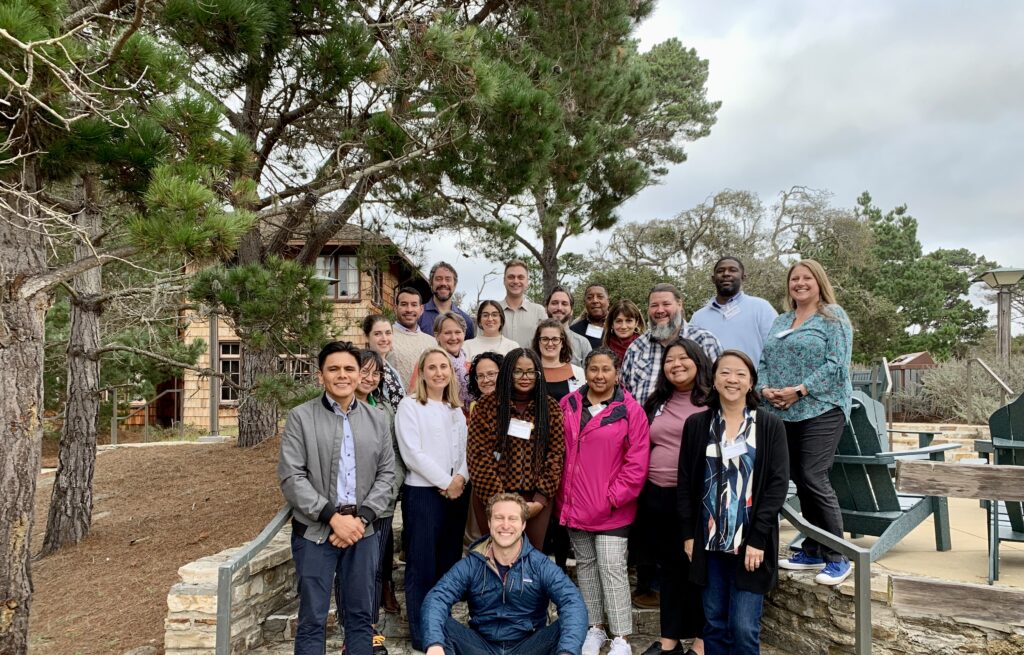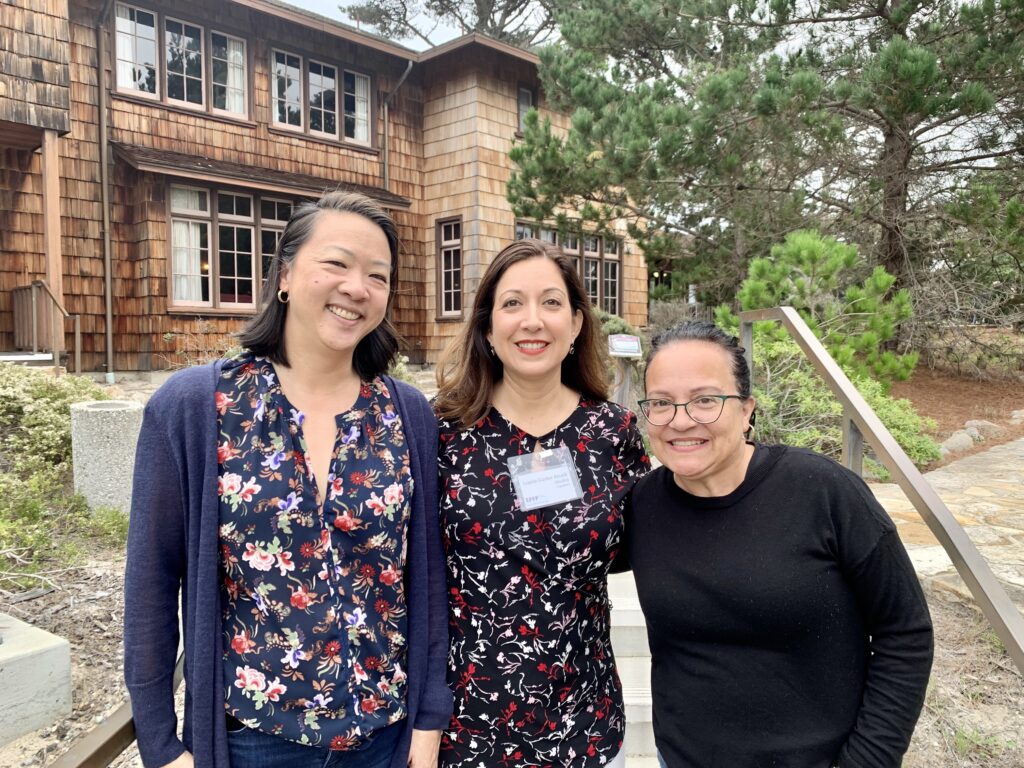In October 2022, the 2022-23 California Education Policy Fellows (EPFP) resumed in-person meetings for the first time since the COVID-19 pandemic. The group convened at the Asilomar Conference Grounds in Pacific Grove, CA, where they had the opportunity to participate in team-building activities, listen to an EPFP alumni panel, and learn how to leverage their strengths for leadership, and racial justice.

CA EPFP’s 2022-23 Cohort
For our “Making Change from Where I Sit,” series, we invited Lupita Cortez Alcalá from WestEd. Alcalá is currently serving as the Director of Education Policy and Outcomes and we invited her to share about her career and journey. Throughout her career, she has worked to create access and opportunities to college and university for students of color to give them future career options.
The “E” in Education. As a first-generation English learner, Alcalá grew up in the San Diego area and learned very quickly that educators can create great relationships with students to “make you feel good about yourself.” She was taught that it was best to “fit in” and not stand out, because there was discrimination towards immigrants, especially for those with accents—so she studied how to speak English without an accent and never played Mexican music out loud. She had to deny who she was to survive. However, she also learned how to navigate getting into college—which she accomplished by observing what to do from her friends. When she started UC San Diego, she was convinced she wanted to become an attorney. However, after helping to plan and participate in MECHA’s high school conference and working for UC San Diego’s Early Academic Outreach Program, she realized her desire to work in education. Eventually, she graduated from UC San Diego and attended the Harvard School of Education. While there, she experienced the “Harvard Flu,” a type of impostor syndrome, since as she saw things “everyone was so articulate”—meaning the other students knew how to communicate the connections between the academic content and personal experiences or current events that she found difficult to do. Despite her personal challenges, she successfully earned a master’s degree in education policy.
The “P” in Politics. After returning to California, Alcalá worked in government relations, becoming a lobbyist for the California School Boards Association (CSBA). Kevin Gordon, her manager at that time, advised her to work in the legislative arena (Kevin was the CSBA’s chief lobbyist and assistant executive director and is currently the President of Capitol Advisors Group, LLC). Kevin recalled, “Lupita actually interviewed for a board policy consultant position at CSBA and I was on the interview panel with the head of that department. But I knew she would be incredible as part of our legislative team and selfishly redirected her attention away from the board policy folks at CSBA over to my team in governmental relations. It was a great move as evidenced by her remarkable career advancing the cause of public education among the highest leaders in State government.”

EdInsights’ Dr. LeAnn Fong-Batkin, WestEd’s Lupita Cortez Alcalá, the Center for California Studies’ Leonor Ehling
Before she began working at CSBA, she was unfamiliar with her local Assemblymember or Senator, and had to quickly get up to speed. She was regularly put in situations where she had to address policy issues that she did not have in-depth knowledge about, but she did the research and educated herself. She recalls working on supporting more nutritious school meals and snacks to combat obesity and Type 2 diabetes in children and the controversial removal of sodas, candy and non-nutritious food from vending machines, as well as building awareness and opposing school bullying.
Within a few years, Alcalá was offered an appointment to work for Governor Davis as his Deputy Legislative Secretary (who was eventually recalled) and credits this experience as the most amazing, as well as the most challenging. She then went to work for Jack O’Connell, a former Assemblymember and Senator, who eventually became a two-term State Superintendent of Public Instruction. Former Superintendent O’Connell and Chief Deputy Superintendent Gavin Payne gave her the opportunity to lead Government Affairs and the Charter Schools Division. Payne is currently the CEO of GPC Advisors, LLC and when asked about Alcalá’s leadership, said “No matter what we asked Lupita to do, she tackled it with skill and poise. And believe me, we asked her to take on some tough assignments.” After O’Connell termed out, she worked for former Assemblymember and Senator Tom Torlakson at the California Department of Education (CDE), who became a two-term State Superintendent of Public Instruction. Former Superintendent Torlakson and his Chief of Staff gave her the opportunity to lead the Instruction and Learning branch at CDE. “Lupita is an amazing leader. She has an unparalleled understanding of education policy in California and the nation, and I appreciate her leadership in CDE’s major policy work in career pathways, STEM and STEAM, and in many other areas,” said former Superintendent Torlakson. Alcalá also chaired the Commission on the Status of Women and Girls.
Since arriving to Sacramento, in addition to her work in policy and program administration, Alcalá was often called upon to use her Spanish language skills for interviews and to review press releases. She recalls a poignant moment having to figure out how to say “achievement gap” in Spanish (brecha educativa). Her advice to the fellows that speak Spanish, or another language, is to learn it well enough to academically read, write and do an interview, because you get exposed to people, situations, and areas that you may not otherwise have the opportunity.
After working at CDE for over a decade, Alcalá wanted to learn how to lead an agency and took an opportunity to become the Executive Director of the California Student Aid Commission (CSAC). Her new role was to turn around the agency and show progress, as the control agencies and the Legislature were dissatisfied with the CSAC at that time. She pushed policy discussions on college affordability to the forefront of CSAC’s work, also bringing in basic needs. After a few years she left CSAC to rejoin the CDE as the first California Latina Chief Deputy under State Superintendent of Public Instruction Tony Thurmond.
Alcalá had an incredible opportunity at CDE to support California’s 1,000 school districts. However, she had a desire to focus and improve education system transitions between early education to pre-K-12 and K-12 to postsecondary education and joined WestEd to work on the Master Plan for Early Learning and Care.
“What you do with your time is important,” Alcalá noted. During her career at the CDE, she worked on policy issues for the whole child, English learner and migrant students, STEM/STEAM education, the California Career Pathways Trust, and many other major initiatives that worked to improve career pathways for California’s students.
Her advice to the fellows was to learn about policy, finance, leadership, networking, and the value of genuine relationships. “When you stop learning, it is time to move on. Who you work for matters. Don’t forget to give leaders grace, they are human too.”

